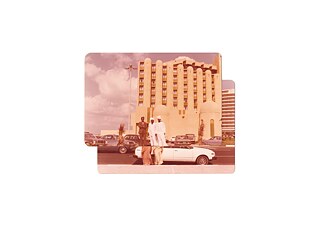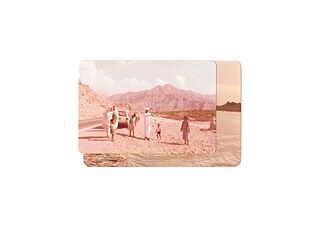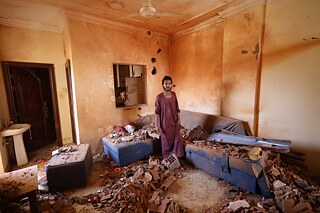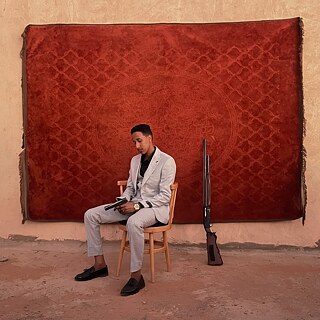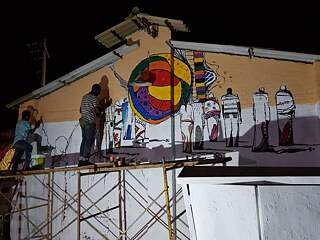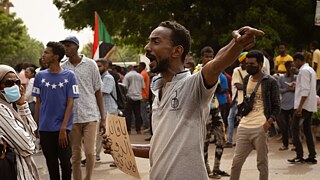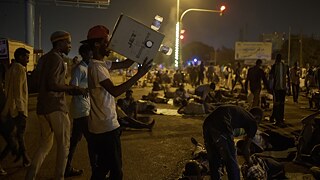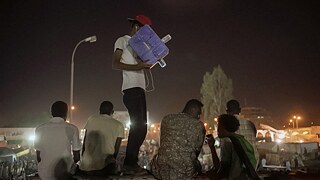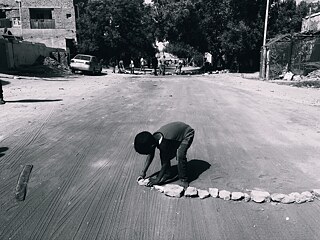Exhibition
Fragile Traces: Archives in Conflict
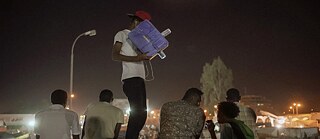
Contemporary Sudanese Art
Sudan. A country at war. A nation where hopes ran high during a peaceful revolution, only to be dashed and give way to great hopelessness in the current crisis. Sudan – in focus at Kurzfilm Festival Hamburg.
Artists possess the ability to translate historical events and cultural nuances into visual, auditive and haptic forms. In the complex nexus of history, politics and culture, they come to the fore as archivists of collective memory and often also of the oral history of a nation. In this role as record-keepers, artists challenge the conventional notions of history and memory and extend the purview of archival practices to incorporate diverse perspectives, untold stories and marginalised voices. They amplify voices that have been silenced, illuminate forgotten stories and confront with uncomfortable truths that are often overlooked by the work of traditional archives.
Through these various forms of expression, artists record narratives and conserve emotions and experiences that shape our cultural heritage and build a bridge to the future. History becomes accessible to experience, in all its complexity. The contradiction is part of the whole. Indeed, it is the contradiction that serves as a catalyst for opening new ways of understanding history. In this way, artists encourage dialogue, reflection and a critical approach to historical narratives. Manipulation, revisionism and erasure are part of history. That is why it is all the more important that the stories of the past remain alive, relevant and accessible to all.
For this reason, it is especially in times of political instability and violent conflict that artists play a decisive role in the preservation of history and stories. As a reaction to the outbreak of war in Sudan in April 2023, many artists intensified their work, in order to document the dramatic situation and preserve it for the future. Inside Sudan itself and later in exile in Cairo, Qatar, Nairobi or Kampala, they use diverse media to call attention to themselves and the violent destruction, to explain how it could come to all this, or to create perspectives for the future.
These are fragile traces that the artists follow in their works. They reach back to draw on their private archives, on snapshots, on collective memory, to give us, as onlookers, insight into a country at war.
Photography plays a major role in the exhibition. With the project Postcards from Khartoum, photographers André Lützen and Ala Kheir have created a platform that makes it possible to share snapshots from Khartoum, from Sudan. Ala Kheir, who documented the situation locally following the outbreak of the war, now supports other photographers from exile.
Photographer Metche Jaafar followed the peaceful resistance of the civilian population in 2019. Her work captures the emotional weight of the uprising, without making any claim to objectivity. These are images of life, of hope and solidarity.
Rund Alarabi, a member of the artist collective Locale, invites exhibition attendees to view an excerpt from her personal photo archive. In her work Circa Now, she connects the history of her country with the present via images of her family.
The film-based work Suddenly TV by Roopa Gogineni depicts a group of young revolutionaries founding an imaginary TV station during a sit-down strike, giving expression to a vision of a new Sudan. In addition to their individual artistic practices, many Sudanese artists are also actively involved in institutional archiving projects.
One major example is the SIKKA project, initiated by the Goethe-Institut Sudan. Sikka means the path in Arabic. A group of authors living in the diaspora, composed of artists and cultural workers, gathered documents, photographs and recordings made during the revolution of 2019. The energy emanating from the street at the time, the power of the many that made change possible, everything now buried in the war now at least has a place of its own. State cultural institutions play a central role in Sudan in the archiving of national heritage. The National Museum in Khartoum is home to an impressive collection of artifacts and documents that reflect the millennia-old history of the country. The national radio and television broadcasting companies possess extensive sound and image recordings that capture important events and personalities in Sudanese history. The outbreak of war in April 2023 has had disastrous consequences for these state archives. Many facilities were specifically targeted for attack and destroyed, leading to the irretrievable loss of irreplaceable cultural artifacts. Private collections in private households also fell victim to the fighting, as soldiers plundered residences and robbed family heirlooms. In this threatening situation, the digital archiving projects advanced in recent years are proving to be real lifelines for the cultural heritage of Sudan. Various private and institutional initiatives have at least been able to secure a portion of the endangered materials, by capturing them in digital form and making them accessible online. These efforts have succeeded in rescuing valuable testaments to Sudan's past and present from destruction. Through their creative practices, their involvement in individual and institutional projects and their co-operation with state-run cultural institutions, artists contribute significantly to safeguarding the diverse narratives and traditions of Sudan for future generations. In particular in light of the destruction wrought by the current war, these efforts have proven themselves to be inestimably valuable in preserving the country's rich heritage and keeping its identity alive in times of conflict as well.
Curated by Larissa-Diana Fuhrmann, Maike Mia Höhne and Qutouf Elobaid (Künstlerinnenkollektiv Locale).
Further details on the participating artists and their artistic works can be found in the programme overview of the Short Film Festival Hamburg.
Programme
Exhibition opening: Tuesday, 04.06., 7 AMCurator Larissa-Diana Fuhrmann, together with artist and activist Eythar Gubara and Maximilian Röttger, project manager of Goethe-Institut in Exile, will open the exhibition Fragile Traces: Archives in Times of Conflict with works by Sudanese artists.
Opening hours: Wednesday, 05.06. - Sunday, 09.06., daily from 11 AM
Guided Tours: Friday, 07.06., 1 AM & Sunday, 09.06., 3 PM
As part of the exhibition, the discussion Preserving Sudan's Archives: Challenges in Maintaining of Analogue and Digital Collections will take place on Saturday, 08.06. at 1 AM in the Forum.
This exhibition is a cooperation between the Short Film Festival Hamburg, the Goethe-Institut in Exile and the Goethe-Institut Sudan.
Details
OPEN SPACE (Forum) - Kurzfilmfestival Hamburg
Price: free entrance
